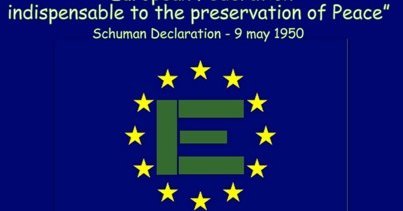In the misery of the aftermath of the war, all European countries west of the Iron Curtain wanted the reconstruction on the ruins of the European civil war to be achieved through unity, rather than in the same divisions that caused the tragedy. Among the sixteen countries protected by the US and gathered in the Council of Europe, the majority - led by the United Kingdom - conceived unity as a simple cooperation between independent and sovereign States: an alliance by its own nature fragile, weak and precarious, especially since it excluded Germany.
Jean Monnet, on the contrary, believed that it was necessary to open a new chapter in European history: he was persuaded that, based on the Franco-German reconciliation, common institutions should have been created to lay the foundations of a new State. The latter was not intended to remove nations, but to subjected them to a democratic power with limited but real competences, able to empower Europeans to speak with one voice in the world: the European Federation. Monnet, therefore, proposed to found the Community and Schuman, the French minister of Foreign Affairs, joined with the consent of Adenauer’s Germany, De Gasperi’s Italy and the three Benelux countries. The door remained open to other members of the Council of Europe, in case they eventually decided to contribute to the construction of the European Federation.
“The French Government proposes that Franco-German production of coal and steel as a whole be placed under a common High Authority, within the framework of an organisation open to the participation of the other countries of Europe. The pooling of coal and steel production should immediately provide for the setting up of common foundations for economic development as a first step in the federation of Europe, and will change the destinies of those regions which have long been devoted to the manufacture of munitions of war, of which they have been the most constant victims...by pooling basic production and by instituting a new High Authority, whose decisions will bind France, Germany and other member countries; this proposal will lead to the realization of the first concrete foundation of a European federation indispensable to the preservation of peace”. (Schuman Declaration, 9th May 1950).
The Community has made great progress, up to the adoption of a single currency. It did not however, reach the goal – which was increasingly urgent - to establish a genuine Federation. This goal, on the contrary, is now openly sabotaged: the long institutional construction which led to the entry into force of the Lisbon Treaty (1st December 2009) was characterised by the failure of everything that could recall the federal perspective inscribed in the Declaration of 9th May 1950, as well as by the refusal to recognise the Union’s symbols (flag, anthem, and the very term “constitution”).
Yet the European Union works well in those areas where the federal method was introduced, whereas it is far from reaching its citizens in other cases...
Yet the European Union works well in those areas where the federal method was introduced, whereas it is far from reaching its citizens in other cases: just to mention an example, we could think about the defensive role that the Euro has played in the global financial crisis on the one hand, and on the other hand we may consider the dangerous paralysis of the EU in front of the economic, fiscal and credit problems brought to the surface by the global recession. Or think about the embarrassing ineffectiveness of the Europeans at the Climate Summit in Copenhagen, which they even hosted, and where they had presented a common position. The fact is that neither the Euro-zone nor the Union are a Federation!
There is not such a thing as a European federal government having adequate own resources, being democratically legitimate and accountable to its citizens; there is not a federal government in the position to implement an economic policy, which could transmit to citizens the benefits and the huge potential for development - rather than just protection - of the single European currency. Europe, moreover, cannot speak on equal terms with other countries in the world, even when the 27 agree. There is no single seat for a European federation in the UN, nor a single representation in all international forum; in fact, there is not a common foreign, security and defence policy, able to ensure at the same time saving of public resources and considerable increase of effectiveness for the citizens.
The Lisbon Treaty cannot be considered the culmination of the integration process. While Europe takes time, the world’s problems run away and become increasingly out of reach for us Europeans, a damage for the Europeans and for the world itself.
For these reasons, the Lisbon Treaty cannot be considered the culmination of the integration process. While Europe takes time, the world’s problems run away and become increasingly out of reach for us Europeans, a damage for the Europeans and for the world itself. We must return to the inspiration of the Schuman Declaration, through which France and Germany revitalised the idea of European pacification by starting an initiative open to all, but determined to overcome the inertia of the Council of Europe.
Following the first in-successes of the new ‘after Lisbon EU’ the awareness is spreading that, by exploiting the possibilities and contradictions of the Treaty, a group of states can give rise to a vanguard - within or outside the treaties - open to anyone who shares the political project of the European Federation. That is the way today to revitalise the idea of Europe, an actor still missing but essential to the achievement of peace, freedom, social justice and an ecologically oriented system in an increasingly interdependent world.
To complete the process towards a real European democracy and overcome, therefore, the intergovernmental nature of the EU it is necessary to involve the people: citizens must find expression through constituent and ratification forms of truly democratic nature, not only structured in accordance with national membership. The European citizens and their representatives therefore, for every level and in every sector of the economic, social and cultural system, are called to make their voices heard in every context and with every existing political interlocutor (national and European parliaments, national governments, political parties). They need to demand that their requests, their problems and their proposals for a better world are implemented through a genuine European federal government, the executive body of a supranational democratic statehood open to all European countries: the European Federation.


Follow the comments: |
|
